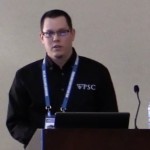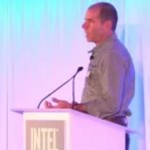In this video from the Intel HPC Developer Conference at SC15, James Reinders hosts an Intel Black Belt discussion on Code Modernization. “Modern high performance computers are built with a combination of resources including: multi-core processors, many core processors, large caches, high speed memory, high bandwidth inter-processor communications fabric, and high speed I/O capabilities. High performance software needs to be designed to take full advantage of these wealth of resources. Whether re-architecting and/or tuning existing applications for maximum performance or architecting new applications for existing or future machines, it is critical to be aware of the interplay between programming models and the efficient use of these resources. Consider this a starting point for information regarding Code Modernization. When it comes to performance, your code matters!”
Video: The SeqAn C++ Library for Efficient NGS Sequence Analysis
“SeqAn (www.seqan.de) is an open-source C++ template library (BSD license) that implements many efficient and generic data structures and algorithms for Next-Generation Sequencing (NGS) analysis. It contains gapped k-mer indices, enhanced suffix arrays (ESA) or an (bidirectional) FM-index, as well algorithms for fast and accurate alignment or read mapping. Based on those data types and fast I/O routines, users can easily develop tools that are extremely efficient and easy to maintain. Besides multi-core, the research team at Freie Universität Berlin has started generic support for distinguished accelerators such as Intel Xeon Phi in a new IPCC. In this talk we will introduce SeqAn and its generic design, describe successful applications that use SeqAn, and describe how SeqAn will incorporate SIMD and multicore parallelism for its core data structures using the pairwise alignment module as an example.”
Building A Real-Time, Closed Loop fMRI Data Analysis System for Neuroscience Experiments
Prof. Kai Li from Princeton presented this talk at the Intel HPC Developer Conference at SC15. “Full correlation matrix analysis (FCMA) is an unbiased approach for exhaustively studying interactions among brain regions in functional magnetic resonance imaging (fMRI) data from human participants. In order to answer neuro-scientific questions efficiently, we are developing a closed-loop analysis system with FCMA on a cluster of nodes with Intel Xeon Phi coprocessors. In this talk, we will discuss our current results and future plans.”
Podcast: Top 10 Ways Intel Will Drive HPC Democratization in 2016
The use of High Performance Computing continues to grow in the enterprise and beyond. In this podcast, James Reinders from Intel describes how Intel will continue to drive HPC democratization in 2016. “At Intel, our passion to help drive the democratization of HPC is exemplified by many things. Here is my list of ten things which caught my attention as being most significant as we enter 2016.”
Visualizing Biomolecular Complexes on x86 and KNL Platforms: Integrating VMD and OSPRay
John Stone from the University of Illinois presented this talk at the Intel HPC Developer Conference at SC15. “VMD is designed for modeling, visualization, and analysis of biological systems such as proteins, nucleic acids, lipid bilayer assemblies, etc. It may be used to view more general molecules, as VMD can read standard Protein Data Bank (PDB) files and display the contained structure.”
Video: Job Launching – Keeping Pace with Expanding Complexities
Bill Nitzberg from Altair presented this talk at the Intel HPC Developer Conference at SC15. “Everyone benefits from faster, more resilient infrastructure – the small, the medium, and the really big. This talk will cover how job management software like PBS connect applications with system resources and present optimal paths for application execution.”
Using OpenStack to Manage a Data Analytics HPC Cluster at PSC
“This talk will discuss the plans to use OpenStack to manage and automate dynamically changing an environment to provide users a highly re-configurable software environment with access to a large number of operating systems and software packages on the “Bridges system.” It will feature elements of OpenStack related to bare-metal booting, network provisioning, container management, storage, and scheduling nodes to match the workloads of the users.”
Use-Cases and Methods for Scalable Enterprise HPC in the Cloud
In this video from the Intel HPC Developer Conference at SC15, David Pellerin, HPC Business Development Principal at Amazon Web presents: Use-Cases and Methods for Scalable Enterprise HPC in the Cloud.
Video: Working Together on Frameworks for HPC Systems with OpenHPC
“OpenHPC is a collaborative, community effort that initiated from a desire to aggregate a number of common ingredients required to deploy and manage High Performance Computing Linux clusters including provisioning tools, resource management, I/O clients, development tools, and a variety of scientific libraries. Packages provided by OpenHPC have been pre-built with HPC integration in mind with a goal to provide re-usable building blocks for the HPC community.”
Video: OpenMP and the Intel Compiler
In this video from the Intel HPC Developer Conference at SC15, Kent Millfield from TACC presents: OpenMP and the Intel Compiler. “The OpenMP standard has recently been extended to cover offload and SIMD. The Intel compiler has provided its own implementations of offload and SIMD for some time before the extensions to the OpenMP standard was approved, and that standard is still evolving. This talk describes what you can do with the Intel compiler that you cannot yet do in OpenMP including some where gaps are getting closed soon, and some which will remain for a while. The talk will also highlight where things are done differently between the language interfaces of the Intel compiler and the OpenMP standard. The talk is relevant both to those who seek to port existing code to the OpenMP standard, and to those who are starting afresh.”













